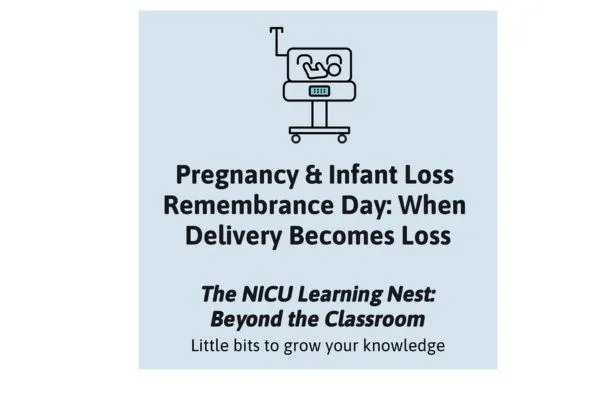
Pregnancy and Infant Loss Awareness Day
💜 When Delivery Becomes Loss: Caring for the Silent Moments
Every NICU nurse remembers the first time a delivery ended in silence.
The moment the monitors stop, the team looks around, and someone quietly calls time of death. It’s a moment that humbles even the most experienced among us.
Pregnancy and Infant Loss Awareness Day, observed every October 15, reminds us that not every birth leads to the care we’re trained to give — but every birth deserves the same skill, respect, and compassion.
Understanding the Clinical “Why”
Stillbirth and death at delivery are among the most devastating events in perinatal care. In the United States, about 21,000 babies are stillborn each year — roughly one in every 175 pregnancies. Globally, that number rises to nearly two million.
For NICU and delivery teams, these losses often occur intrapartum or immediately after birth, during what was expected to be a routine delivery. Common causes include:
Placental complications like abruption, infarction, or maternal vascular malperfusion leading to acute hypoxia.
Cord emergencies such as prolapse, true knots, or velamentous insertion that cut off blood flow in seconds.
Uterine rupture or maternal collapse, where the infant loses perfusion abruptly.
Infection or fetal sepsis, particularly with prolonged rupture or chorioamnionitis.
And sometimes, despite every test, no clear reason at all.
Understanding these pathophysiologic pathways isn’t about blame — it’s about readiness. Because the difference between chaos and calm in those first minutes often comes down to preparation.
What Skilled NRP Looks Like — Even When It Fails
There are moments when the resuscitation itself is textbook.
PPV delivered with visible chest rise.
Closed-loop communication keeping the team synchronized.
Epinephrine drawn up and ready without hesitation.
And still, the baby doesn’t come back.
Even when efforts fail, good NRP still matters.
It demonstrates competency, ensures clear documentation, and gives families the assurance that every possible measure was taken.
In those silent minutes, what defines the team isn’t the outcome — it’s the professionalism, teamwork, and grace they maintain under pressure.
The Power of a “Hot” Debrief
When the resuscitation ends, the room doesn’t need to stay silent.
A short, structured debrief within minutes of the event — often called a hot debrief — can help the team begin to process and learn.
A simple framework includes:
1️⃣ What went well?
2️⃣ What could we have done better?
3️⃣ What supplies or support did we need that we didn’t have?
4️⃣ What’s one takeaway for next time?
This reflection isn’t about blame — it’s about healing and improvement. Debriefing after loss supports emotional safety, identifies system gaps, and reinforces team resilience.
When Delivery Becomes Loss
When efforts end, the nurse’s role shifts — from resuscitation to remembrance.
That transition is powerful and sacred.
It’s the way we handle the baby with gentle hands.
The way we speak softly when offering parents time to hold their child.
The way we protect the family’s privacy and dignity.
Even in loss, there’s nursing to be done. The most skilled nurses know that compassion and composure coexist — and that presence is the intervention when medicine has reached its limit.
Moving Forward Together
Some losses will have clear causes; others will not.
Some will leave the team confident they did everything right; others will linger in memory, replayed and questioned.
That’s the nature of neonatal and perinatal care — both heartbreak and healing exist in the same space.
What we can do is stay prepared.
Stay trained in NRP.
Debrief often and honestly.
And continue to support one another in the work that few outside our world truly understand.
Every October 15, light a candle — not only for the babies who never came home, but for the nurses, providers, and parents who carry their memory forward.
🕯️ Clinical skill saves lives. Compassion sustains the ones left behind.
